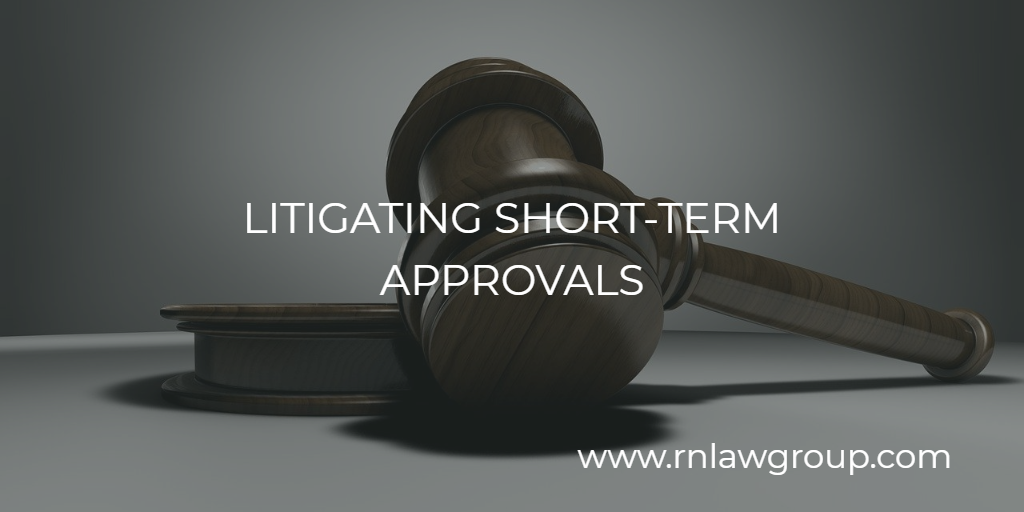
Litigating Short-Term Approvals Following ITServe v.Cissna
This article provides a follow up to Reddy Neumann Brown’s previous article regarding short-term approval litigation which can be found (https://rnlawgroup.com/news/720-suing-uscis-for-short-h-1b-approvals).
Introduction
In the litigation context, the short-term approvals, or partial denials, are any H-1B in which the Petitioner received an I-797 for any duration that is shorter than what they had requested. For example, if you requested an H-1B to be valid through 6/1/2023, and you get an I-797 valid only until 12/31/2020 or even 12/31/2022, your petition likely qualifies for short-approval litigation.
While there are some extremely rate, but legitimate reasons USCIS would properly issue an I-797 for less time than requested, most H-1B short-term approvals are based on USCIS’ non-speculative work assignment rule and their “authorization” to limit H-1B approvals to the length of time that the petitioner can prove “non-speculative work” based on the contracts and letters from all layers. This rule and authorization came from USCIS’ February 22, 2018 Policy Memorandum titled “Contracts and Itineraries Requirements for H-1B Petitions Involving Third-Party Worksites.” This memo requires evidence that “the petitioner has specific and non-speculative qualifying assignments in a specialty occupation for the beneficiary for the entire time requested in the petition.”
Multiple lawsuits have been filed challenging short-term approvals and H-1B denials stemming from this policy memo, but until recently, all of these lawsuits have been settled out before a judge could rule on them.
ITServe Alliance v. Cissna
In October, 2018, massive litigation was filed challenging USCIS’ adjudication processes following the February 22, 2018 memo. As it pertains to short-approval litigation, there were two issues challenged that apply short approvals. First, is USCIS’ authority to even give short-approvals. Second, whether the USCIS is required to provide a written decision when it issues these short-approvals.
Throughout the ITServe opinion, Judge Collyer went in-depth about the unlawfulness of the non-speculative work assignment rule which has led to these short term approvals. Further, to the extent that a short approval is justified, meaning it is justified for some other reason other than the non-speculative work assignment rule, USCIS must provide a written decision as to the reason for the shortened approval.
The complete opinion can be found here:
What Can You Do if You Get a Short-Approval?
The ITServe opinion provides a tremendous vessel for new lawsuits to be filed against USCIS for these short-approvals. In all future lawsuits filed against USCIS, ITServe can be cited repeatedly to show the judge, and USCIS, that this issue has already been taken up, and that the likelihood of success on these lawsuits are high as the non-speculative work assignment rule should continuously be found to be unlawful. While judges are free to make their own opinions, the ITServe decision will be a tough one for USCIS to overcome.
As great of a ruling as ITServe v. Cissna is, it does not immediately change USCIS’ policies. USCIS is only bound to follow this rule within Washington D.C., and unfortunately, no USCIS H-1B adjudications take place in D.C. Further, USCIS does not typically adopt court rulings until three appellate courts of appeals rule the same way. So for now, it is possible that H-1B petitioners will still short-approvals and RFEs on the specific non-speculative work assignment rule.
Companies sponsoring employees for H-1B should be prepared to litigate on these short term approvals. Doing so allows companies to likely force USCIS to reopen and approve these cases for the requested validity period. This accomplishes three things for the companies litigating these. First, it allows them to save money in the long-term. Filing a lawsuit for a 6-month approval to pressure USCIS to issue the proper 3-year approval is more cost efficient than filing a new H-1B extension every 6-months. Second, successful litigation resulting in a 3-year approval reduces the company’s risk. Given the fact that USCIS has historically high denial rates, filing multiple extensions in a 3-year prior opens the company to the risks associated with filing. Finally, this provides stability for the company to provide to their clients and their employees. The end-clients are not at risk of losing a resource due to a denial due to continuous filings of extensions, and employees drastically reduce their risk of a denial which may lead them out of status or unlawfully present in the United States.
Reddy Neumann Brown’s litigation team is prepared to file short approval litigation on behalf of your company and is guide your company through the short approval litigation process. Should you wish to get more information on short-approval litigation, please contact litigation@rnlawgroup.com, or set up a consultation with a member of our litigation team: Steven Brown at https://appointments.rnlawgroup.com/.
By: Steven Brown
Steven Brown is an attorney in the firm’s H-1B Department and represents our business clients throughout the entire H-1B, H-4, and H-4 EAD process. Additionally, Steven works with clients with Department of Labor Compliance included assistance with wage and hours investigations. Steven prides himself in being able to provide his clients with creative solutions to complex immigration problems.

